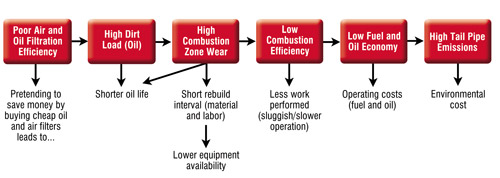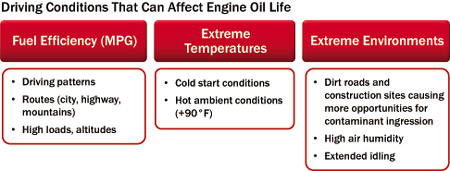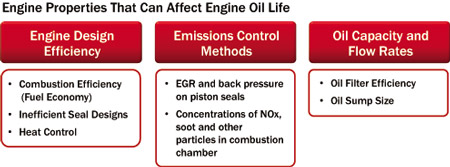the oil advantage
How to optimise oil change intervals for buses and trucks
Oil change intervals differ for each individual vehicle, even two identical Volvo B12B could experience different oil life; one might reach 80,000km, but the other may need fresh oil by 24,000km. This variance in engine oil life is the result of three main factors:
- Engine Design, Age and Conditions – Engine design characteristics and numerous running conditions can affect oil life factors from exposures to contaminants and other conditions.
- Driving Patterns and Conditions – Where and how the truck is driven.
- Oil Properties – Quality and formulation performance of the engine oil.

MachineryLubrication.com provides a great in depth overview of these three factors.
Ideal time to oil drain
The ideal time to change the engine oil is when the damaging effects of the oil conditions are more significant than the costs and time saved by extending the interval. Short-term damaging effects include the loss in fuel efficiency, long-term effects involve permanent damage to internal engine components, which can cause unnecessary costs for repairs, rebuilds and downtime.
Checking the engine oil regularly makes it easier to find the ideal time, this would be:
- When the engine oil’s attributes degrade to its condemning limit.
- When there is a loss of base number (BN) associated with lubricant conditions leading to internal corrosion.
- When soot and sludge form and could settle or attach on internal engine components.
However, these conditions are not always obvious through truck operation, the best answer lies with the operator’s ability to monitor the quality of the oil at any given moment either in real time (on-line sensors) or periodically by oil analysis.


Learn more about oil analysis from our blog post Benefits of an oil analysis.
Premium synthetic oil vs regular mineral oil
Mineral oil is most commonly called as regular oil produced by untreated mineral refining. Semi-synthetic oils or synthetic-based oils are produced by untreated mineral refining and composed of oils produced by mineral refining with chemical treatment.
Synthetic oil costs twice as much however it lasts longer and has a much higher return on investment in the long term. Compared to regular oil, synthetic oil has many advantages:
- Synthetic oil change frequency is lower than regular oil change frequency.
- Highly resistant to viscosity breakdown (the ability of the oil to flow easily in all temps) from heat, friction, chemical contaminants• Better low- and high-temperature viscosity performance at service temperature extremes.
- Better viscosity index (VI)
- Better chemical and shear stability.
- Decreased evaporation loss.
- Resistance to oxidation, thermal breakdown, and oil sludge problems.
- Possibility to extended drain intervals, with the environmental benefit of less used oil waste generated.
- Improved fuel economy in certain engine configurations.
- Better lubrication during extreme cold weather starts.
- Possibly a longer engine life.
- Superior protection against “ash” and other deposit formation in engine hot spots, less oil burnoff and reduced chances of damaging oil passageway clogging.
- Increased horsepower and torque due to less initial drag on engine.
- Improved Fuel Economy (FE).
Best premium oil
We recommend using premium synthetic oil approved by bus and truck manufacturers to maintain your warranty such as FUCHS oil. Learn the benefits of FUCHS lubricants here.
Latest news
-
 New Tranzmile Catalogue Out Now
New Tranzmile Catalogue Out Now
-
 Ryco Flyer Out Now
Ryco Flyer Out Now
-
 2nd Hand Engine Parts Clearance
2nd Hand Engine Parts Clearance
-
 Narva Flyer Out Now
Narva Flyer Out Now
-
 We have exciting news to share...
We have exciting news to share...
-
 Mercedes Actros parts to suite Actros V1, V11 and the new Actros models. Aftermarket and geniune parts available.
Mercedes Actros parts to suite Actros V1, V11 and the new Actros models. Aftermarket and geniune parts available.
-
 Whites Diesels are your Volvo FH13 Specialists
Whites Diesels are your Volvo FH13 Specialists
-
 Whites Diesels are the Mercedes-Benz 2222 experts. We keep a huge range of parts to keep your classic work-horse on the road and earning you money.
Whites Diesels are the Mercedes-Benz 2222 experts. We keep a huge range of parts to keep your classic work-horse on the road and earning you money.
Find the part you need
Try us out. Tell one of our bus or truck parts specialists what part you're after. You'll be pleasantly surprised with the help you receive.
Stay up to date with the latest news
Sign up to our newsletter
National Branch Network
-
Sydney, New South Wales
19 Memorial Avenue, Ingleburn NSW 2565 -
Townsville, Queensland
1/585 Ingham Road, Mount St John QLD 4818 -
Gold Coast and Brisbane, Queensland
4 Computer Road, Yatala QLD 4207









